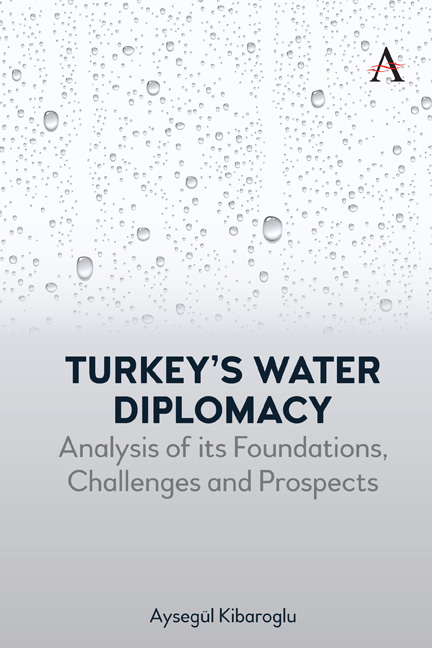Book contents
- Frontmatter
- Contents
- Acknowledgements
- List of Abbreviations
- Introduction
- 1 Institutional Setting
- 2 Water Diplomacy Principles
- 3 Turkey’s Evolving Position vis-à-vis International Water Law
- 4 The Role of History and Geography in Turkey’s Evolving Water Diplomacy
- 5 Analyzing Non-State Actors and Processes in Turkey’s Water Diplomacy Framework
- Conclusion
- References
- Index
1 - Institutional Setting
Published online by Cambridge University Press: 24 March 2021
- Frontmatter
- Contents
- Acknowledgements
- List of Abbreviations
- Introduction
- 1 Institutional Setting
- 2 Water Diplomacy Principles
- 3 Turkey’s Evolving Position vis-à-vis International Water Law
- 4 The Role of History and Geography in Turkey’s Evolving Water Diplomacy
- 5 Analyzing Non-State Actors and Processes in Turkey’s Water Diplomacy Framework
- Conclusion
- References
- Index
Summary
Overview
This chapter delineates the institutional setting in transboundary water policymaking in Turkey. Water has become an issue in Turkish foreign policy in the early 1980s with Turkey's plan to build a series of large-scale dams and extensive irrigation systems in the upper reaches of the Euphrates–Tigris (ET) river basin within the context of the Southeastern Anatolia Project (GAP in Turkish acronym). With the increasing profile of the GAP in the international arena, a bureaucratic structure has evolved since then where the principles and policies with regard to the transboundary waters have been determined. The Ministry of Foreign Affairs (MFA) became the main official body for formulating as well as executing Turkey's transboundary water policy. In this context, a separate department/unit in charge of regional and transboundary waters was formed at MFA under the directorate general, which is responsible for issues pertaining to energy, water and the environment.
The relevant institutions within the state mechanism, which provide technical information, such as the status of water resources in terms of quality and quantity, as well as those responsible for the development, management and preservation of water resources, have been entrusted to work in conjunction with the MFA in the formulation of the fundamental principles of transboundary water policy. First and foremost, among these institutions is the State Hydraulic Works (DSI in Turkish acronym), which has been responsible for the development and management of Turkey's water resources since 1954. Moreover, in 2011, within the restructuring process of the government, the mandate of the Ministry of Environment and Forestry (MEF) was reorganized under two new ministries. It was in this context that the Ministry of Forestry and Water Affairs (MFWA) was established. Under the MFWA, the General Directorate of Water Management (DGWM) and the Turkish Water Institute (SUEN in Turkish acronym) were established as new public institutions to provide inputs to transboundary water policy.
There is also a growing interest in conducting humanitarian water diplomacy by the leading water agencies such as the DSI. Turkey's water infrastructure investments in Africa and water projects completed in Turkey and beyond borders for displaced people in Syria constitute main achievements in this regard.
- Type
- Chapter
- Information
- Turkey's Water DiplomacyAnalysis of its Foundations, Challenges and Prospects, pp. 9 - 30Publisher: Anthem PressPrint publication year: 2021

